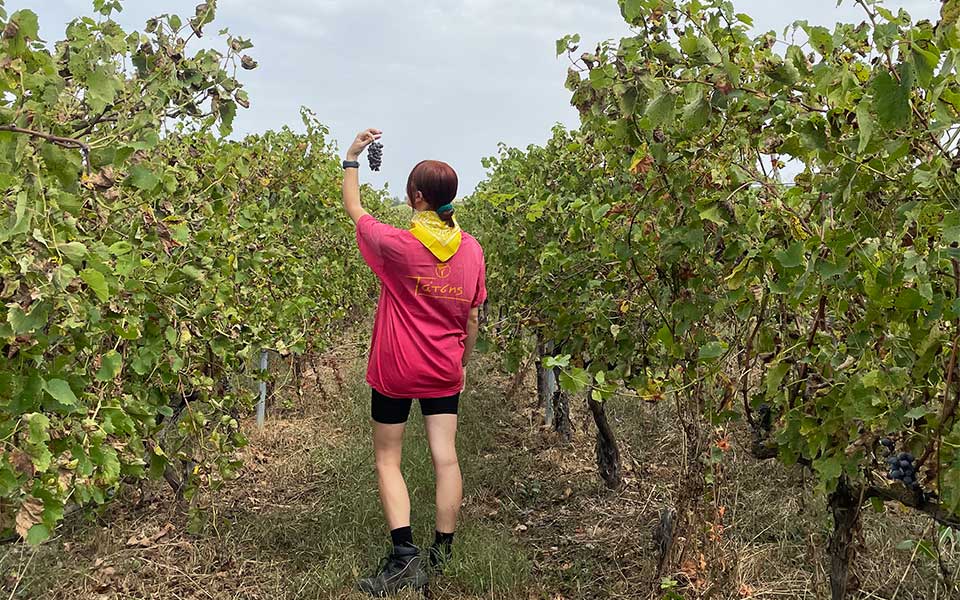A multi-day expedition through the wine country of Central Macedonia with chef Giorgos Palisidis found us in a van each morning at 7:30. By 9:00 am, we were tramping through vineyards in our galoshes or gathering in a cellar, wine glasses in hand, notebooks out, enjoying conversation as interesting as the wines. The most engaging ideas of all were coming from some dynamic, principled young women, each devoted to making superb organic wines.
They talked about sustainability, about permaculture, about the flora and fauna that share their ecosystems, and about exploring the potential of indigenous grape varieties. And they shared some pretty extraordinary creations, including natural wines, biodynamic wines, orange wines, earthy and effervescent Pét-Nats, and a carbonically macerated wine. Here’s who we met, what we talked about, and what we drank:
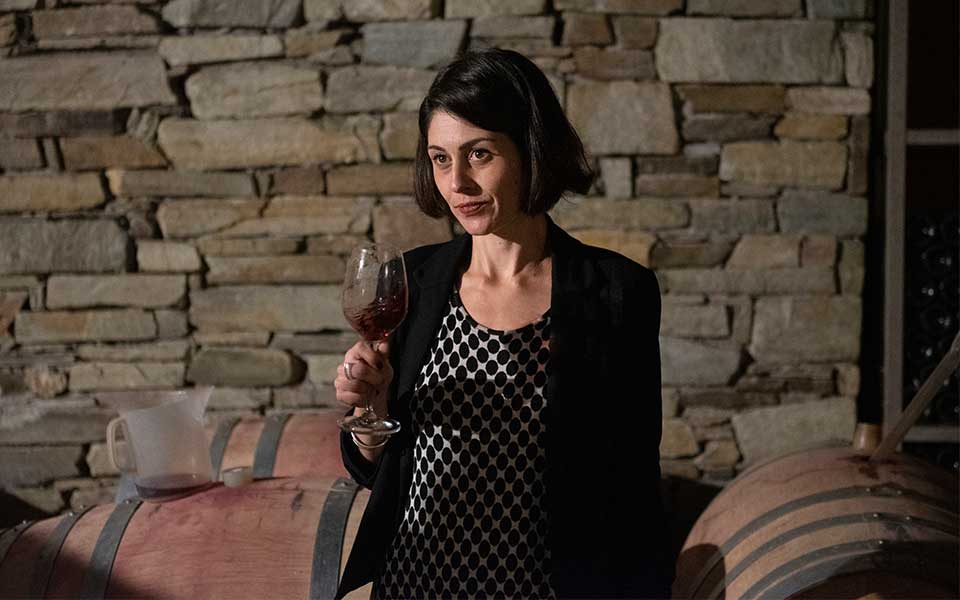
© Alexandros Avramidis
Chloi Chatzivariti – Domaine Chatzivaritis
The story of Domaine Chatzivariti is like that of many Greek wineries: a love of food, wine, and above all the pleasure of good company led Vangelis Chatzivaritis – a mechanical engineer by profession – to start making wine to enjoy with family and friends. His wife, Olga Iakovidou, was from some excellent wine country: Goumenissa, home of the PDO of the same name. They planted five hectares in 1994. It went well; they acquired more land, and built a lovely winery in 2007. To the PDO Goumenissa – a blend of Xinomavro with a 20% minimum of the local grape Negoska; Chatzivatiri’s is 70/30 Xinomavro/Negoska – they added more labels. They now also cultivate Assyrtiko, Malagousia, Muscat, Roditis and, in smaller amounts, Cabernet Sauvignon, Chardonnay, Merlot and Sauvignon blanc.
Growing up in a creative family whose lives had been transformed by wine was an ideal foundation for an adventurous winemaker: “I’m very fortunate to be making my own wines at my age: not only to have the family winery but, above all, to have creative freedom.” After studying agriculture at the Aristotle University (with a brief interlude where she considered acting instead) and then oenology in France and Portugal, Chloi worked in wineries in France, Argentina, Chile, and New Zealand. When she returned to Greece in 2017 she began making low-intervention wines and employing new methods such as carbonic maceration and pétillant naturel (Pét-Nat). The Negoska Carbonic drew lots of interest, and so did the attention she received from the influential Mark Andrew, who included her Xinomavro (today’s miniMus) in a piece on the variety in Noble Rot in 2018.
Natural, organic winemaking is a reflection of her values. In a recent talk with Stathis Kalyvas at the Athens Concert Hall centering on innovation, she spoke of how perceptions of wine drinkers are undergoing a significant shift: “For previous generations, wine was sometimes attached to status; an expensive bottle of wine was an impressive bottle. Our generation doesn’t care about that; we’re interested in authenticity, sustainability – a connection with nature.”
What Chatzivariti is known for
Organic, low-intervention, truth-centered wines that let the character of the grape, the terroir, and the qualities of the specific vintage shine through.
What we’re drinking
Goumenissa’s indigenous grape Negoska is explored through two interesting approaches. “A carbonic (anaerobic) maceration for Negoska Carbonic highlights notes of red fruits, like sun-dried strawberry. For SPIN, I do two harvests of Negoska – one in late August to make a dark rosé wine that retains some acidity, and another one in late September, from which I make a red wine with a good phenolic structure. Blended together, they balance out Negoska’s relatively low acidity and high tannins.”
What Chloi is interested in
“I want to make wines that reflect the variety of the grape, the place where it thrives, the specific conditions of that year – whatever those may be – rather than try to ‘fix’ them. I would like to let the wines speak for themselves. Wine for me doesn’t have to be perfect; it has to be honest and true.”
Info
Domaine Chatzivaritis
6th km Goumenissa Kilkis Rd.
9:00-16:00, Mon-Fri Tel. (+30) 23102.152.59
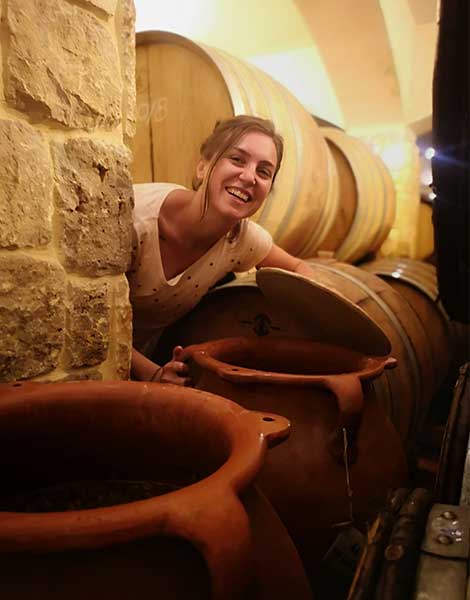
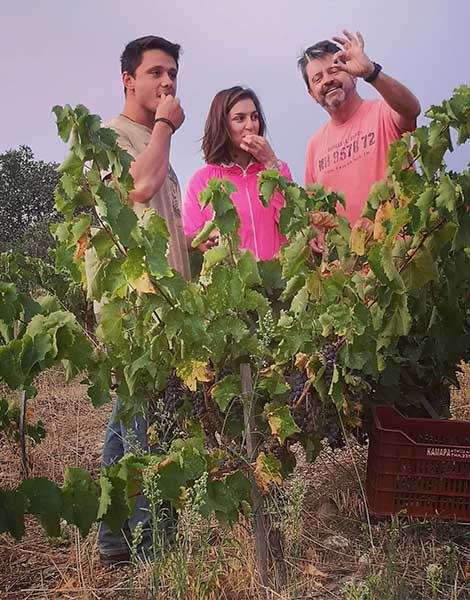
Stavroula Kioutsouki – Domaine Kamara
We could, at least in one sense, call Stavroula a first-generation winemaker. True, it was her parents who planted the first 11 hectares of vines when she was just 16, but her family views winemaking as a collective process and so perhaps it’s best to say they did it all together.
Her father, Dimitris, provides the experience and inspiration. Her brother Apostolos takes care of the economic aspects, and Thanasis is the engineer. Stavroula decides what they’re planting and what they’re making with it. She studied agriculture at the Aristotle University, specializing in trees and vines, followed by oenology at the Agricultural School of Athens, then a harvest in Bordeaux, and another in Burgundy. She took over the vinification at Kamara in 2022.
What Kamara is known for
The family’s ethos of collectivity is mirrored in their harmonious relationship with nature. Fostering a permaculture (permanent agriculture) approach is the foundation of their winemaking philosophy, expressed in biodynamic, low-intervention wines with an unfiltered look and a juicy earthiness of taste.
What we’re drinking
Pét-Nats are always an occasion, and Kamara’s have an extra edge of wildness – that haziness, the slight hint of yeast; it’s like an event, a wine that’s still active. Nimbus Ritinis, a resinated orange wine, unites the ancient and contemporary.
What to look for
The labels are original artworks by Stavroula, and their names hold a key to their identity. “Shadow Play,” for example, refers to the shadow theater of Karagiozis: “Despite its [surface] simplicity, Karagiozis illustrated the complexities of society. Our Shadow Play Red – a single variety wine from the indigenous Greek grape Xinomavro – similarly reveals hidden dimensions.”
What Stavroula is working on right now
“I was researching the writings of Columela, a 1st-century AD Roman philosopher who wrote a lot about agriculture. He proposed that the best wine was made from vines which climbed up trees – more precisely the Ulmus Minor – the field elm, or καραγατσι (“karagatsi”) in Greek, according to the translation that I’ve read. We planted some a couple of years ago, and now we planted some Assyrtiko vines beside them, as well as some near other trees, and some in the traditional Goblet pruning system. Given that vines are meant to climb, and in nature, it’s up a tree that they would be climbing, Columela’s idea makes sense: reflecting how the vine grows naturally, it eliminates another facet of intervention. In a few months, we’ll see how they grow, and in three to four years, we may hopefully be able to have some sort of production.”
Info
Domaine Kamara
Kioutsouki Family 24th km Thessaloniki-Serres Rd
By appointment Tel. (+30) 23410.649.80

Evanthia Mitropoulou – Domaine Nerantzi
In 1988, Domaine Nerantzi made its first wines as a celebration of tradition and culture. A decade later, they set up a small winery by their vineyard – 1.3 hectares in Eptamili, in the Serres region.
What transformed Domaine Nerantzi from a very small family winery into something more ambitious was Evanthia herself. Her foundation in the world of wine guided her to a degree in chemistry, and a masters in oenology. The family acquired more vineyards, and started to build their new, larger winery in Pentapolis.
Evanthia studied chemistry at the Aristotle University in Thessaloniki, focusing on food chemistry and biochemistry. After this, she took the DNO (National Diploma of Oenology) in Dijon, Burgundy, France, where she also did a pre-stage in St Emilion, Châteaux Boutisse Grand cru, Bordeaux, and further research in Beaune, Domaine Champy, Burgundy.
Meanwhile, as the winery expanded and Evanthia pursued her studies, Domaine Nerantzi began a significant project: pursuing official recognition for two indigenous grapes of Serres, the white grape Asprouda Serron and the red grape Koniaros. While Evanthia’s father, Nerantzi Mitropoulos, interfaced with the Department of Agriculture, Evanthia researched Koniaros in its every aspect; her final degree project focused on her research on the aromatic profile and the phenolic component of Koniaros in correlation with the duration of skin contact at fermentation. Their united dedication resulted in a PGI designation for the Serres region.
She and her father remain a strong team – they’re out in the vineyards daily together, and they do everything in the cellars themselves, too. Apart from some help in the vineyards, this is a family operation, right down to the presentation; Evanthia’s mother, Kyriaki Dagkouli, hand-paints each bottle of Koniaros. Evanthia is making wines of some distinction. Internationally well-regarded, some of Domaine Nerantzi’s wines are winning not only awards, but also spots on the wine lists of some serious wine-forward restaurants abroad.
What Domaine Nerantzi is known for
Besides championing the indigenous grapes of Serres, the family shares a dedication to heritage and culture, and a respect for the land. Their organic farming practices embrace the ecosystem: spiders and wasps keep the more threatening insects in check (a wasp stars on the label of the Limnio red; it’s protecting the vines by eating a grasshopper). In “The Wines of Greece”, Konstantinos Lazarakis (MW) notes that Domaine Nerantzi’s wines have “a consistency and huge personality.”
What we’re drinking
What’s this rare Koniaros like? It’s a big red, but not just in the spice/jammy red fruit direction; there are cherries, but also a little tobacco, and even some violets. “In years with low grape yields,” Evanthia tells us, “the violets are particularly pronounced.”
What Evanthia is interested in right now
“We’re building a second winery that will be gravity-fed, in which the stages of wine-making happen on descending levels. With no mechanical pumping, there’s no introduction of excess oxygen. In addition to being more sustainable, it’s a gentler, lower-intervention process. The wines are never subjected to force, and develop naturally, with no over-extraction.” Evanthia is also currently following a program involving distillates at the National and Kapodistrian University of Athens, in preparation for the distillery that Domaine Nerantzi will soon open.
Info
Domaine Nerantzi
15th km Serres-Drama Rd.
Tel. (+30) 23210.72060 or (+30) 693.866.1757
Mon-Sat 09:00-17:00
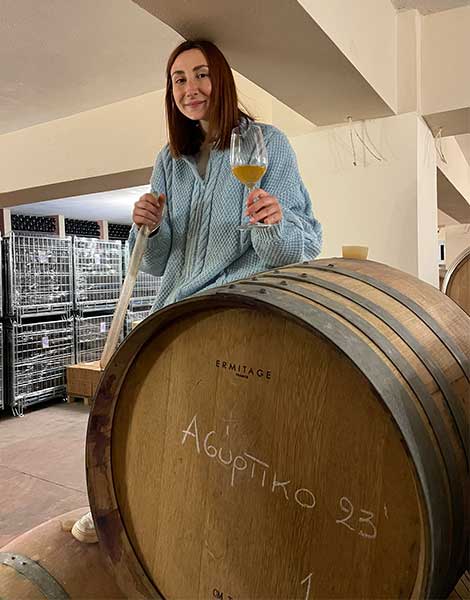

Maria Tatsis – Domaine Tatsis
Maria Tatsis, a member of the fourth generation of the Goumenissa wine-making family, grew up wandering through the vineyards and having a small glass of dry red wine every day with lunch with her grandfather. Wine – like food – is a sensible, integral part of the Tatsis family life.
Winemaking has always been at the center of everything she loved: the family, winery, and vineyards. Studies first in food science at the American Farm School and then in oenology and viticulture seemed natural choices. But it took her first season at Hatzidakis, the Santorini vineyard of close friends of the Tatsis family, to understand how she felt about winemaking itself: “The strength of the emotion I felt for those vines was just as if they were my own.” She did another season in the Peloponnese at Tetramythos, doing everything but working among the vines.
She missed the plants; so she went to France to be a vineyard worker in Burgundy, from spring through November of 2022. The intense work among the vines from dawn through the afternoon sun confirmed again the depth of her attachment to the life cycle of the grape.
The 2023 harvest was her first as a winemaker, together with her father, at Domaine Tatsis.
What Domaine Tatsis is known for
Since the beginning, when Maria’s great-grandfather Tatsis arrived in the fertile lands of Goumenissa from Eastern Rumelia (now Bulgaria) with some of his own vines, Domaine Tatsis has been making organic, low-intervention wines. Which is perhaps why they don’t make a big thing of it; this is the way of the past – winemakers or not, most families in this rich wine country had at least a couple of vines from which they would make wine for themselves, without pesticides, using only natural yeasts. When Perikles, Maria’s father, and her uncle Stergios went to a biodynamic winemaking seminar in Thessaloniki in 2002, they found it aligned with their philosophy, and they integrated further biodynamic practices into their winemaking. A biodynamic almanac guides their focus each day, harmoniously aligning their activities with the earth and the constellations.
On the one hand, Maria is a revolutionary winemaker; her focus on sustainability, harmony with nature, and freedom from chemicals, places her at the front of the curve. But from where she’s standing, she’s doing something completely obvious. “We’re an organic, biodynamic winery; we make naturally fermented, low-intervention wines with minimal filtration. We look at nature and the skies, just as generations before us did. We don’t think about the titles; we’re making wines as we always have. It just happens to be organic, natural, biodynamic wine.”
What we’re drinking
Domaine Tatsis’ Goumenissa PDO is 50/50 Xinomavro/Negoska blend, making for a full expression of the local grape. The Cinsault/Negoska comes with a story: the Cinsault vines arrived in the rucksacks of French soldiers who were glad to be posted to such famously good winemaking country during WWI. The fountain in Goumenissa’s town square, inscribed in French, was erected in their honor. Konstantinos Lazarakis (MW), in “The Wines of Greece,” singles out Tatsis’ Roditis: “a serious take on orange wine…. already considered by many a revelation for the variety.”
What she’s interested in
“Being among the vines, 365 days a year. The grape is the alpha and the omega of what we do. Before anything else, we’re grape farmers.”
What Maria’s working on now
“This year’s harvest was a little rough; we lost some grapes to downy mildew, so it seemed like a good time to experiment. I hand-picked some Assyrtiko, grape by grape, pressing them in a barrel and agitating them daily for maximum skin contact, as with an orange wine. Then I did the same with more of the same Assyrtiko grapes in another barrel, this time pressing whole bunches with their stems, to see to what degree the stems affect the wine.”
Info
Domaine Tatsis
2nd km Goumenissa-Filirias Rd.
By appointment Tel. (+30) 23430.430.60
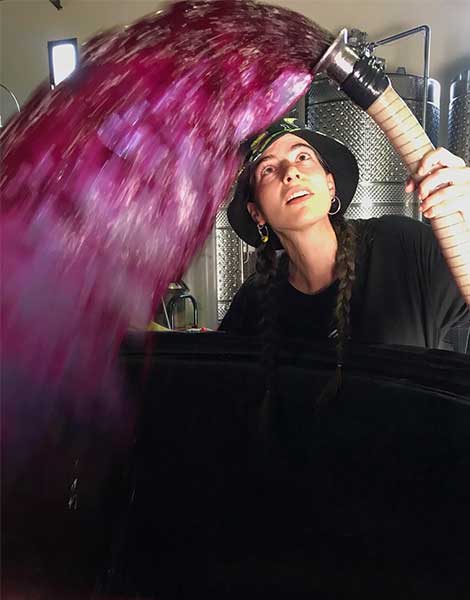
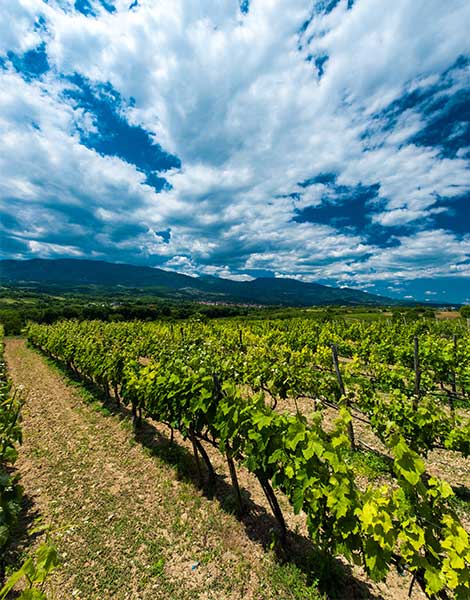
Anthi Charalaboglou – Domaine Charalaboglou
The loamy hillsides southwest of Drama, rich in clay and silt, are home to the organic vineyards of the Charalaboglou family. They grow a range of grapes – nine Greek varieties (Assyrtiko, Malagouzia, Malvasia Aromatica, Rhoditis and Vidiano are for the whites, and Agiorgitiko, Koiniariko, Mavrotragano, and Mavroudi are for the reds) and eight international favorites. Wildflowers and other native plants share the sloping vineyards; the symbiotic ecosystem enriches the soil with organic matter, while the natural competition for resources encourages the vines to develop a hearty root system. The vines are watered only with whatever flows beneath the soil, down the slopes or from the sky.
Anthi grew up among the vines; her parents, once farmers, turned to wine exclusively in 1999 when Anthi was not yet ten. After studying agricultural engineering at the Aristotle University in Thessaloniki, then oenology in France, she left for New Zealand for some practical experience afield. This is where she met Matt van der Spuy, also a winemaker. When the pandemic ebbed, they returned to make wines together in the family vineyards.
Anthi’s objective is to make wines that reflect the truth of the grape, whatever that truth may be. The Anthesis (“Anthi” is blossom in Greek) line of wines from the estate is made up of varietals focusing on expressing the characteristics of distinctive Greek grapes: a Serres Koiniariko (vinted by just a handful of winemakers – see Evanthia Mitropoulo, below), an Assyrtiko, and a Malagousia. Her sister, the artist Cranna Boglou, designs the labels.
What Charalaboglou is known for
A relatively young, second-generation family winery that has always been organic.
What we’re drinking
Their rosé Pét-Nat, a Malvasia Aromatica and Mavroudi blend, has a juicy note of watermelon. The white Pét-Nat, of Moscato d’Alexandria, is marked by aromas of pineapple and lychee.
What Anthi is interested in right now
“We’re making some field blends of Viognier, Malvasia Aromatica and Sauvignon blanc growing in the same vineyard. We harvested them together on a single day, the grapes varying in ripeness. We pressed them together, the greener notes of the barely ripe grapes and the sugars of the fully ripe ones balancing each other, while a natural ferment gives a full expression of their character. The result is like a snapshot, capturing the vineyard at a moment in time.”
Info
Domaine Charalaboglou
Municipality of Amphipolis, Krinida Serres
Mon and Wed 12:00-22:00, or by appointment Tel. (+30) 23240.917.56

